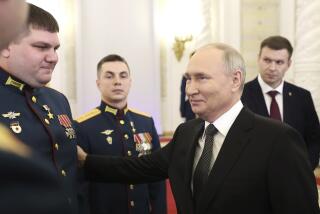Yeltsin Czar for Economic Reform Quits : Russia: Deputy Prime Minister Gaidar cites frustration over not having the power to carry out his reforms. Some see his move as a maneuver to be given more muscle.
- Share via
MOSCOW — Yegor T. Gaidar, the brain behind Russia’s economic reforms, announced Sunday that he is quitting the government, citing the tremendous frustration of being blamed for decisions that he could not control.
“I cannot serve in the government and at the same time be in opposition to it,” Gaidar said in a letter to President Boris N. Yeltsin. “I cannot be responsible for reforms without having . . . the necessary levers to carry out the economic policy in which I believe.”
Gaidar, the portly, 37-year-old economist who launched Russia’s reforms in late 1991 and has done the most to push them forward, has become a symbol of Russia’s move from a Communist economy toward a market-driven system. His resignation is likely to worry both financial circles and the Western powers backing the transformation.
Yeltsin is expected to discuss the resignation with Prime Minister Viktor S. Chernomyrdin today, and a spokesman said the Russian president might not accept it.
Some politicians called it an ultimatum meant to persuade Yeltsin to give Gaidar more power.
But Ella Pamfilova, the social protection minister who added her resignation to Gaidar’s, said: “This is not an ultimatum. This is an act of despair, including by me.”
Gaidar himself, in a television interview and his letter to Yeltsin, did not appear to be merely posturing--he seemed to be worn down by a one-man fight against inflation and loose-fisted government spending.
He said he plans to concentrate on leading Russia’s main reform party in Parliament, and he even went so far as to support Grigory Yavlinsky, a radical economist in a rival party, to replace him as first deputy prime minister in charge of the economy.
His resignation also came as an unexpected postscript to the Russian-U.S. summit that ended Saturday, at which Yeltsin reportedly told President Clinton, “Gaidar stays.”
*
In Geneva, however, Clinton Administration officials said Yeltsin had warned them that Gaidar would resign and that the resignation would be accepted.
Secretary of State Warren Christopher noted in Geneva on Sunday that Gaidar had not been particularly effective in selling his economic program to the Russian public, and he suggested that it might be a step forward if he was replaced by someone more “sensitive” to the hardship felt by ordinary Russians.
“Mr. Gaidar, who is a very interesting, attractive person, was, after all, the head of a party that didn’t do very well in the elections,” Christopher said on NBC television’s “Meet the Press.” “So I wouldn’t attribute undue significance to his leaving. There are other very strong reformers on President Yeltsin’s team. And I think the important thing is President Yeltsin’s commitment to reform.”
Gaidar, who leads the Russia’s Choice reformist bloc that trailed embarrassingly behind an ultranationalist party in Dec. 12 parliamentary elections, did not mention the voting as a reason for his resignation, but it seemed to have influenced him.
He and his allies were forced to take responsibility for the pain of the reforms, while Chernomyrdin stayed aloof from the campaign.
Gaidar’s letter to Yeltsin named two recent incidents that contributed to the sense of powerlessness that led to his resignation.
First, he said, the government had agreed to let the ruble become the currency of the former Soviet republic of Belarus, a move that could hurt Russia’s economy, without consulting him.
And second, also without his consent, Chernomyrdin allocated $500 million to build a new center for the Parliament now that the Russian White House--the old Parliament building--has been taken over by the government.
“This sum far exceeds the resources allocated with great difficulty in 1993 for defense conversion and is five times greater than the federal spending on art and culture,” Gaidar wrote in exasperation. “This sum equals one-fifth of last year’s social spending.”
The two examples were clearly not reason enough to resign; rather, they reflected the basic difference that has split Gaidar and Chernomyrdin all along.
Gaidar advocates a tough monetary policy to fight inflation, while Chernomyrdin has been far more willing to print and spend money.
Recently, Chernomyrdin has been promising Russians that there will be no more “shock therapy,” implying that social spending will be increased.
Their conflict reached a boiling point as Chernomyrdin went about reshuffling the Cabinet under a Yeltsin decree that calls for slashing the number of posts. The new lineup of ministers is scheduled to be announced Tuesday.
Yeltsin, who seems to have tried to remain above the Cabinet infighting, will be forced to referee between his prime minister and his economics chief today.
A year ago, he nominated Gaidar as his prime minister but ended up accepting Chernomyrdin after the Russian Congress rejected Gaidar.
Whether he will once again choose Gaidar over Chernomyrdin is not certain. Yeltsin has assured the world that his tough reforms will continue despite the strong election showing by ultranationalists who profited from widespread discontent, but he has jettisoned Gaidar before out of political necessity.
*
If Gaidar and like-minded Deputy Prime Minister Boris G. Fyodorov--who has yet to be invited into the new Cabinet--end up on the outside, the point man for Gaidar’s team of radical reformists will become Anatoly B. Chubais, the head of Russia’s privatization program and the likeliest man to replace Gaidar as economics czar.
Gaidar said his allies had decided they would not quit the government as a group. Some areas of policy, such as foreign affairs, satisfy reformers, he said, and each will make an individual decision.
Gaidar noted that Chernomyrdin had asked him how he would feel about being replaced by rival economist Yavlinsky, and Gaidar said that he would “warmly welcome this.”
But Yavlinsky, speaking on Russia’s NTV network, indicated that he would not be eager to join a Cabinet that he said would be a “traditional Soviet government” with “no (policy) line.”
A spokesman for Chernomyrdin maintained that the government will continue reforms with or without Gaidar.
“The government has been and will be reformist,” spokesman Valentin Sergeyev said.
*
But Gaidar said he feared that his resignation could be followed by a return to socialist-style economics.
Times staff writer Doyle McManus contributed to this report from Geneva.
More to Read
Sign up for Essential California
The most important California stories and recommendations in your inbox every morning.
You may occasionally receive promotional content from the Los Angeles Times.













